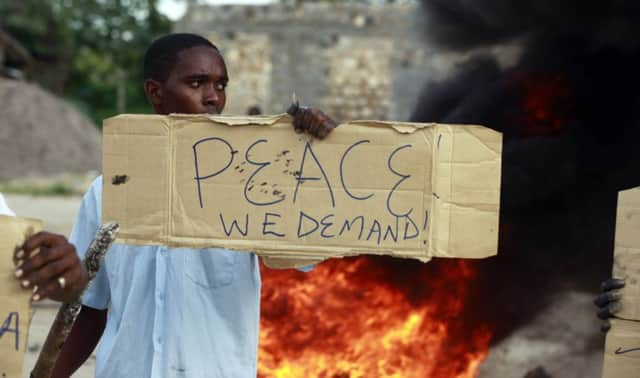‘Kenyan politicians to blame for massacres’


In a nationally televised address, Mr Kenyatta said yesterday that despite claims of responsibility from al-Shabaab, the Somalia-based Islamist extremists were not behind the violence.
The Somali militants had claimed responsibility for the attacks near the tourist resort island of Lamu that targeted non-Muslims.
Advertisement
Hide AdAdvertisement
Hide AdThe latest attack came on Monday night in Majembeni village in which ten people died. The village is next to Mpeketoni, where 49 Christian men were killed overnight on Sunday.
Al-Shabaab said the second attack killed government workers and Christians. A county commissioner, Benson Maisori, said the attackers appear to have been the same in both cases.
“The style of killing is the same. They slit the victims’ throats or shot them in the head,” said Mr Maisori.
However Mr Kenyatta said outright that al-Shabaab did not plan and execute what he termed ethnically motivated violence, but rather it was inspired by local political leaders.
He said police officials in Mpeketoni had advance intelligence about the attack but did not act on it. The president said some officers had been suspended and would be prosecuted.
Mr Kenyatta said some political leaders were preaching the idea that some Kenyans are less human than others. “My deputy and I will never go the route of ethnic violence,” he added.
The attacks highlight the weak security around the Lamu area, which lies just south of the Somali border. Lamu once attracted swarms of foreign visitors but its tourist sector has been suffering in recent years because of the violence.
Interior minister Joseph Ole Lenku said a new group of government and security officials have been installed in Lamu, in part because “there seems to be some inside job”.
Advertisement
Hide AdAdvertisement
Hide AdMr Ole Lenku said the problem facing the country “is elaborate and is intended to cause discord among our people”.
Meanwhile, Muslim leaders conferred inside Nairobi’s largest mosque. The elders from four different groups condemned what they called savage acts and ghastly killings and said there was no justification for the deaths.
The Muslims leaders warned of a potential sectarian rift.
“The continued violence risks tearing the country apart,” they said. “We need to be cognisant of the fact that some of these attacks are aimed at planting seeds of discord and animosity among Kenyans and dividing the country along ethnic and religious lines.”
The Muslim leaders said the government was making “knee-jerk reactions” and harassing specific communities, a reference to Kenya’s Somali population, which has suffered in a widespread crackdown in the past few months which has seen the arrests of thousands of Somalis and the deportation of dozens.
A spate of gun attacks and bombings since the Westgate shopping centre attack, particularly in the past two months, has fuelled public anger against the government.
Many Kenyans say the government has not done enough to secure the country.
Locals have said the police had not sent in enough officers to protect them after the initial assault on Mpeketoni.